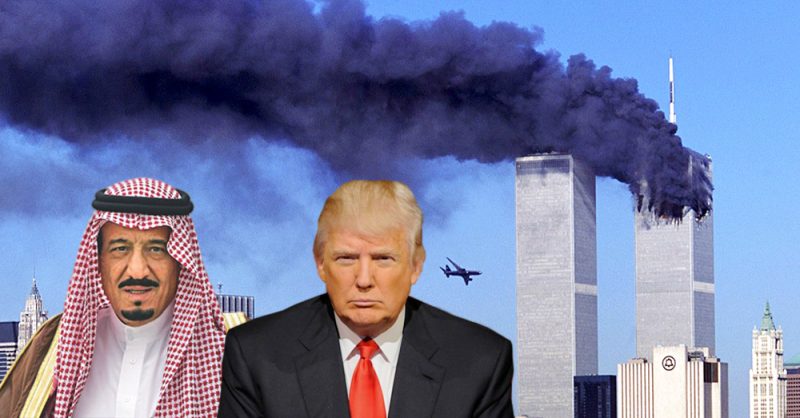When former President Obama had visited New Delhi on the occasion of Republic day, he was impressed about many things in the country especially women empowerment. After that he flew to a country he later praised where issues over rights and women lie in jeopardy with medievalism looming over cosmetic modernity. Saudi Arabia was not so gracious when it was about Michelle Obama’s attire which symbolises backwardness at its best notwithstanding the country being appointed as the head of a human rights panel in the UN. When US presidents are vocal about Islamic state and war on terrorism, the Kingdom in Riyadh somehow is left out of the whole lurch. An array of countries have been invaded and questioned for its despotism but Saudi Arabia has always slipped through the scanner by all means every time.
As Donald Trump assumes presidency after much of a hullabaloo over his election, implementation of his proposed Muslim ban from seven countries has received much unceremonious flak. Protests, criticism and calls for impeachment were unprecedented as never before. Although the ban is more pertaining to flow of refugees and seeming instability in those countries, the other facet is the danger these countries may present to American interests on their soil. Although a lot of people have been vocal about President Trump having business interests in UAE and Saudi Arabia which compelled him to not enforce a ban here, it’s important to note that such wonderful exemptions to Riyadh is not Trump specific but an American leeway policy since decades now.
Inspite of all odds why does Saudi Arabia enjoy a special relationship with the United States even when fifteen of 9/11 hijackers were Saudi nationals in the past and tactically they have been an ISIS facilitator in cahoots covertly at present?
For that we have to go from Trump who’s in the spotlight for his executive decisions to Richard Nixon who was in the line of fire for impeachment owing to the watergate scandal. Nixon in 1971 had barred unilateral conversion of dollars into gold, closing the gold window and then Riyadh and the royal family laced despotic nation came into the picture. Oil rich nation of Saudi Arabia was established as a strategic partner and so it invariably became the onus of the petrodollar system to reinforce dollar as a reserve currency. Promises were made to denominate oil sales for dollars in exchange for American military protection cementing a glorious arms trade relationship that has grown by leaps and bounds over decades and presidents. Being one of the top oil producing countries, the flotation of reserve currency methodology obliterated the gold standard and capitulated the Kingdom to an irreplaceably placating position in American policy and ensured it could not be displaced by any ensuing presidency.
Over the years the cocktail of oil for dollar scheme meshed with increasing arms exports made the relations special in a way that no matter how badly it didn’t fit into American view of the so called free world, it has managed to sink deeper into American doctrine in a region mired by flash points and volatility.
The Americans have bases there all over and according to a Bloomberg report of 2016, Saudis hold 289 billion dollar of US treasury debt even emphasising estimated Arab wealth of trillion of dollars fund investing across the globe furthering dollar consolidation.
And this also works when you sell them your planes and the best of arms as Riyadh pushes itself to be a war mongering partner. When Obama left office, his administration accorded sales of arms worth 115 billion peaking to its highest numbers. War in Yemen touted as a battle against houthies is in fact more about a narrow choke point to the Red Sea and Suez Canal that contributes 11 percent of world Petroleum. As American administrations have admonished despots like Gaddafi, they have conveniently turned blind eye to a geopolitical conflict in Yemen which is aimed at strategic reasons where more than 2000 children are dying coz of malnutrition every week. Another angle to this relationship can also be owing to Saudi being a balancing deterrent to anti Washington posturing Iran and its goals to be a power in the region which is piloted by its ambitious nuclear weapons program.
So when there is an onslaught on the current Trump presidency for getting easy on the Saudis in lieu with Trumps business interests, it’s more necessary to understand economic polices of the past and the current war in Yemen fuelled by continuing arms exports together that has shaped an appeasing approach by American administrations. When Israel has been considered Washington’s closest natural ally, it’s special relationship with Riyadh is under rated.
As the war continues in Yemen and refugee ban is enforced by the Trump Administration, it will be interesting to see how a political outsider such as Trump will deal with the kingdom now following establishment pacification since decades.
